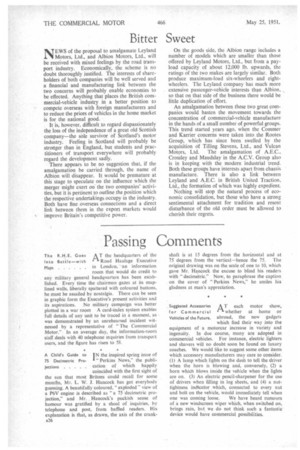Bitter Sweet
Page 28

If you've noticed an error in this article please click here to report it so we can fix it.
NEWS of the proposal to amalgamate Leyland Motors, Ltd., and Albion Motors, Ltd., will be received with mixed feelings by the road transport industry. Economically, the scheme is no doubt thoroughly justified. The interests of shareholders of both companies will be well served and a financial and manufacturing link between the two concerns will probably enable economies to be effected. Anything that places the British commercial-vehicle industry in a better position to compete overseas with foreign manufacturers and to reduce the prices of vehicles in the home market is for the national good.
It is, however, difficult to regard dispassionately the loss of the independence of a great old Scottish company—the sole survivor of Scotland's motor industry. Feeling in Scotland will probably be stronger than in England, but students and practitioners of transport everywhere will probably regard the development sadly.
There appears to be no suggestion that, if the amalgamation be carried through, the name of Albion will disappear. It would be premature at this stage to speculate on the influence which the merger might exert on the two companies' activities, but it is pertinent to outline the position which the respective undertakings occupy in the industry. Both have fine overseas connections and a direct link between them in the export markets would improve Britain's competitive power. On the goods side, the Albion range includes a number of models which are smaller than those offered by Leyland Motors, Ltd., but from a payload capacity of about 12,000 lb. upwards, the ratings of the two makes are largely similar. Both produce maximum-load six-wheelers and eightwheelers. The Leyland company has much more extensive passenger-vehicle interests than Albion, so that on that side of the business there would be little duplication of effort.
An amalgamation between these two great companies would hasten the movement towards the concentration of commercial-vehicle manufacture in the hands of a small number of powerful groups. This trend started years ago, when the Commer and Karrier concerns were taken into the Rootes Group, which has since been swelled by the acquisition of Tilling Stevens, Ltd., and Vulcan Motors, Ltd. The amalgamation of A.E.C.. Crossley and Maudslay in the A.C.V. Group also is in keeping with the modern industrial trend. Both these groups have interests apart from chassis manufacture. There is also a link between Leyland and A.E.C. in British United Traction, Ltd., the formation of which was highly expedient.
Nothing will stop the natural process of economic consolidation, but those who have a strong sentimental attachment for tradition and resent disturbance of the old order must be allowed to cherish their regrets.




















































































